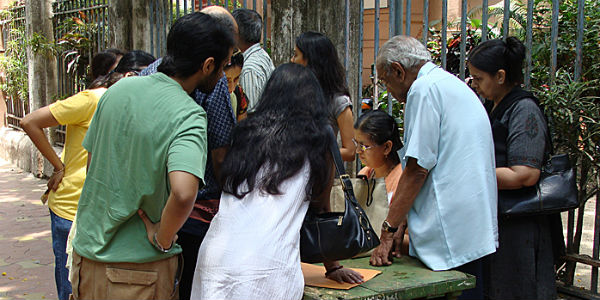Why do voters back corrupt and dishonest politicians? Interview with Milan Vaishnav
A candidate with criminal allegations hanging over them will repel voters – or will they? Not necessarily. In India, a third of the MPs elected in 2014 faced an ongoing criminal case. Milan Vaishnav, the author of a new book about the nexus of crime and democracy in India, talks to Ros Taylor about the appeal of a strongman who can ‘get things done’, even if it means breaking the law – and considers whether some US voters share the same instincts.

Frustration in Mumbai in April 2009 as voters are forced to wait while the electoral officer searches for a name on the roll. Photo: BBC World Service via a CC-BY-NC 2.0 licence
You might assume that political candidates with a criminal record wouldn’t get far at the polls. But your research shows that’s not always the case. More than a third of the MPs elected in India in 2014 faced at least one pending criminal case. What kids of offences were they accused of?
Out of the 543 MPs elected in 2014, 34 percent faced an ongoing criminal case at the time of their election. However, it is important to interpret this number cautiously since many of these cases consist of minor charges that could arguably be related to a politician’s daily vocation or machinations during election time. Many of these cases involve infractions such as unlawful assembly, libel, or disobeying public servants.
But even if we set aside these cases as minor or politically motivated, 21 percent of MPs faced cases of a serious nature. These cases involve charges that, if a conviction were obtained, would merit hard jail time. Here, we are speaking of allegations of attempted murder, assaulting public officials, or theft. Indeed, of the most frequent violations parliamentary candidates are accused of (using data from the last three national election cycles), three of the top five are crimes against the “human body.” Suffice it to say, the severity of the charges lodged against elected and aspiring politicians in India is striking. What’s more, the numbers seem to be roughly similar at the state level.
Were voters simply unaware of these allegations?
In the broader political economy literature, the conventional wisdom suggests that voter ignorance is a prime factor for why criminal or corrupt politicians win elections. There are many good reasons for suspecting this might be true in India as well. After all, poverty and illiteracy continue to be widespread in modern India. Although India boasts a vibrant media, its penetration is still patchy, especially in rural or far-flung locales. Since 2003, candidates are required to publicly disclose their criminal records, in addition to their educational qualifications and financial details. However, one could argue most citizens cannot easily access this data. Despite the plausibility of this “ignorant voters” hypothesis, my research points in the opposite direction; that is, voters are quite knowledgeable about candidates’ backgrounds. But, in spite of the availability of this information, voters still lend their support to candidates with criminal reputations.
What makes them decide to overlook them?
The main argument I make in the book is that voters have a strategic rationale for backing candidates with criminal records. In settings where two conditions are present—weak or unevenly enforced rule of law and highly salient social divisions—politicians can use their criminality as a signal of their credibility when it comes to protecting constituents’ interests. In other words, when social tensions are rife and the credibility of the state is weak, many voters might seek refuge in the hands of a strongman who can fill in for the state’s various governance deficits in service of his particular social or ethnic community. This turns the traditional “information asymmetry” argument on its head; information about politicians’ criminal reputations is hardly invisible—it is integral to voters’ calculations.
The problem isn’t confined to India. According to the NYT, 30 current and former state legislators in New York have been convicted, indicted, or accused of engaging in criminal wrongdoing since 2006. Are US voters making the same calculations as their Indian counterparts when they decide to ignore it?
The nexus of crime and politics is certainly not India-specific. There are similar examples from a range of democracies, from Pakistan to the Philippines. The West is hardly immune. In addition to the example of the United States, in Italy the symbiosis of crime and politics has a long history. In short, I think a very similar dynamic could be going on in the U.S., but with a twist.
There are some scholars who argue that voters, when making electoral choices, often make a mental trade-off between honesty and competence. If you encounter a politician who is corrupt or dishonest, you might be willing to look the other way when it comes to allegations of malfeasance because you rate him or her to be highly effective. There are many American politicians we could think of whose success is probably a result of this sort of calculation. In India, and in other developing democracies, the situation is a bit more complex, I think. It is not simply that voters are making a trade-off between honesty and competence; it is that a lack of honesty or probity actually signifies competence. The difference between the two equilibria probably has a lot to do with the weakness of the state’s writ in many developing societies. In these settings, there might be a premium on having a representative who is willing to run foul of the law in order to “get things done.”
Donald Trump made great play of Hillary Clinton’s alleged criminality, threatening to have her prosecuted. Yet many voters were untroubled by the allegations of sexual assault against him. Is a similar pattern going on?
I’ll admit that I did not think about the connection between the book’s main messages and the 2016 US election at the time, but I have reflected on this a bit after November 8. Fundamentally, many American voters perceive government as broken and decided it was time to blow up the system by electing someone who is willing to do whatever it takes to represent their interests—even if that means skirting legal norms. Furthermore, the 2016 election was highly polarized, both along class as well as racial/ethnic lines. If you take the two ingredients—dysfunctional government and deep social cleavages—they go a long way to explaining the popularity of the “strongman”-rule that Trump seems to offer.
 Milan Vaishnav (@MilanV) is a senior fellow at the Carnegie Endowment for International Peace and the author of When Crime Pays: Money and Muscle in Indian Politics. The book will be released in the United Kingdom and Europe on March 7, 2017.
Milan Vaishnav (@MilanV) is a senior fellow at the Carnegie Endowment for International Peace and the author of When Crime Pays: Money and Muscle in Indian Politics. The book will be released in the United Kingdom and Europe on March 7, 2017.





 Democratic Audit's core funding is provided by the Joseph Rowntree Charitable Trust. Additional funding is provided by the London School of Economics.
Democratic Audit's core funding is provided by the Joseph Rowntree Charitable Trust. Additional funding is provided by the London School of Economics.
The problem with this whole argument outside of specific circumstances is that ‘pending’ criminal cases do not necessarily mean they are guilty or would be found so in a fair and free trial. And alas, we are now so attuned the the real corruption of those right at the top that we assume they regularly fix criminal charges against inconvenient people who have the power to unseat or upend them. Just look at the dodgy nature of the Assange case and the strange inconsistencies and distortions of process and morality going on with it. In many countries, ‘corruption’ (varied definitions all over the world) is so rife that you simply sling such an accusation and get your friend the chief of police to file a charge to damage the other side.
In some countries it is enough to get your friend who publishes the newspapers to simply make lurid and staggering allegations. Indeed when the Maastricht rebels over 20 years ago almost unseated the hapless John Major’s Tory government over a matter of principle, the whips put about such lurid allegations about them of a criminal, medical and personal nature for print by tame newspapers and ‘journalists’ that people like myself were so furious we tore up our membership cards (myself having been a member since the age of 16).
Since then, the sensitivity of politicians in established democracies has become so great that they have even developed laws which attempt to criminalise people who embarrass them, or use counter terror laws against people who tell the truth or whistleblow.
So pardon me while I do not simply take the state at its word when an inconvenient and effective opponent is smeared with criminal or personal charges. And of course the fact that this has happened so broadly has meant that the elite has ensured that yet further the voter despises them and their antics, all designed to ensure the system is maintained in their favour and that their distorted and rigged version of crony capitalism can carry on sending vast (tax free) sums to themselves and their mates with limited scrutiny (or you are carted off to jail under counter terror laws).
btw your point about Clinton and Trump surely demonstrates the problems of all this clearly – it is all, (rightly or wrongly) about who is more believable. There has long been unease about the Clinton Foundation and other aspects of the couple, while the more serious allegations against Trump have smacked of swiftly cobbled together political opportunism based upon the ghastly locker room banter about women in the clip aired.
They key is that voters are switching off from smear campaigns unless they are very very effective or long standing. On that basis you are not making any trade-off when voting, – what you are doing is thinking “lying corrupt elite trying to prevent me from voting for my candidate by smearing him/her, I’ll show them and encourage my mates to show them as well”.